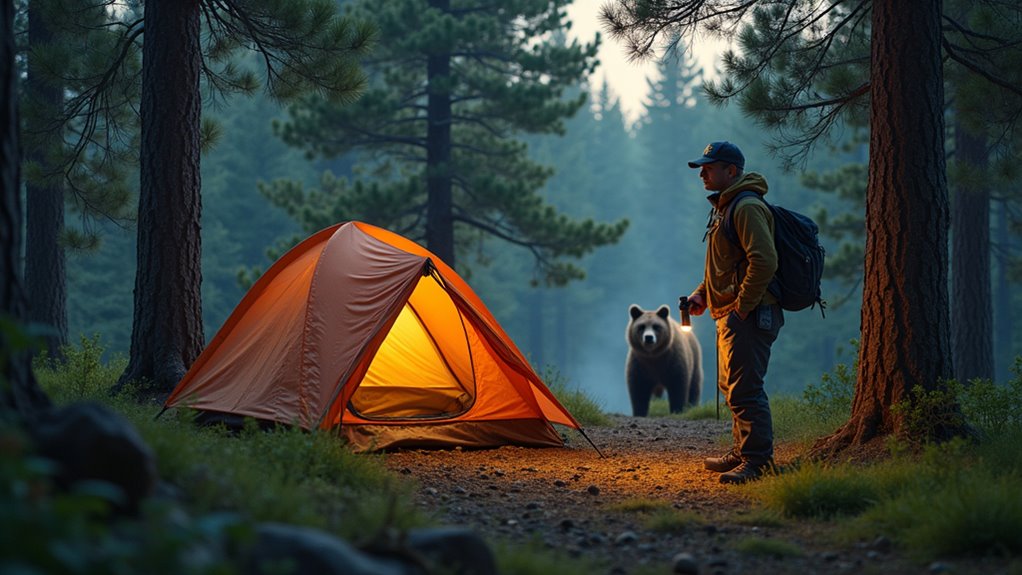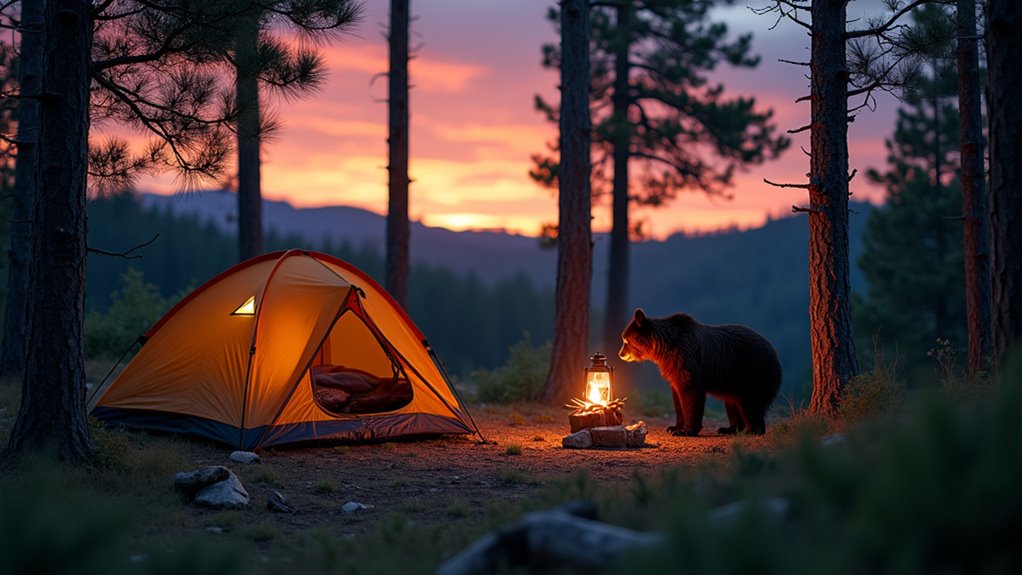What To Do If A Bear Is Outside Your Tent
This post contains affiliate links. As an Amazon Associate, we earn from qualifying purchases.
If a bear is outside your tent, remain calm and take immediate action to deter it. Make loud noises by shouting or banging pots and pans, maintain eye contact, and try to appear larger by standing tall. If the bear is a grizzly, exercise extra caution and keep bear spray within reach. For a safer camping experience, choose campsites away from trails, store food in bear-proof containers, and hike in groups. Additional tips and detailed safety strategies will be provided later in this article for those who want to learn more.
Essential Facts in 30 Seconds
- Identify the bear species to choose the right response.
- Make loud noises to scare the bear away.
- Maintain eye contact and stand tall to appear larger.
- Keep bear spray ready and stay calm near grizzlies.
- Use bear-proof containers and camp away from trails.
Assess the Situation: Identifying the Bear Species
Identifying the bear species outside your tent is important. Start by checking the fur color. Brown or grizzly bears can look dark, like black bears. Black bears can have light fur, such as cinnamon or blonde.
Next, notice the shoulder hump. Grizzly bears have a big hump on their shoulders. Black bears have a flat shoulder line.
Look at the bear’s face shape. Grizzlies have a curved face. Black bears have a straight face.
Check the ears too. Grizzly ears are small and round. Black bear ears are taller and pointy.
Finally, look at the claws. Grizzly bears have long, curved claws for digging. Black bears have shorter, sharper claws for climbing.
Use all these clues to know which bear is outside your tent.
Making Noise: Immediate Responses to Deter the Bear

Spot the bear outside your tent. Make loud noise to scare it away. Shout loudly or clap hands hard. This can startle the bear and make it move.
Keep noise strong if the bear stays. Bang pots or pans together. Use metal objects to make loud sounds. Blow an air horn or a storm whistle. These sounds can scare bears well.
Play recorded bear sounds on a speaker if you have one. Look the bear in the eyes as you make noise. Stand tall to seem bigger. Stay calm and avoid sudden moves. Use steady loud sounds instead.
Bears that are curious but not angry need noise right away. Noise warns them to leave.
Staying Safe Inside the Tent

A bear near your tent needs quick action. Know the type of bear. Black bears often leave if you make noise.
Grizzly bears act more dangerous. Stay calm and watch the bear closely. Keep bear spray ready. Use it only if the bear comes too close.
Your safety inside the tent depends on careful moves.
Assess Bear Species
Bears outside your tent demand careful attention. North America has two main species: black bears and grizzly bears. Knowing their looks and actions helps you stay safe.
| Bear Species | Look | Behavior |
|---|---|---|
| Black Bear | Smaller, round ears, colors vary | Runs away fast when it sees people |
| Grizzly Bear | Bigger, smaller ears, usually brown | Watches closely, may stay nearby |
Watch the bear’s actions closely. Black bears often run away. Grizzly bears may watch you or act boldly, especially near their babies. Never go near bear cubs. Mothers protect them fiercely. Recognizing the species and their behavior guides your safety choices. Stay calm, stay alert, and keep your distance.
Make Noise Immediately
Bears may come close to your campsite without any warning. Making noise right away helps keep you safe. Loud sounds can scare bears and warn others nearby.
Try these ways to make noise:
- Shout loudly or clap your hands to surprise the bear.
- Use an air horn or bear siren for a louder sound.
- Yell “Bear!” to warn both the animal and other campers.
- Shine a flashlight into the bear’s eyes to confuse it.
Stay calm and keep making noise. This helps stop the bear from getting too close.
Being inside your tent at first lowers chances of sudden bear encounters. Always put your safety first and tell others about the bear.
Preventing Future Encounters With Bears
Prevent future bear encounters by picking the right campsite and storing food safely.
Set your camp at least 50 meters away from trails and berry patches. Bears like these spots. Use bear-proof containers to store all food and trash. Wash dishes right after cooking. Pour wastewater at least 50 meters from your tent. This stops smells that attract bears.
Walk in groups and make noise to warn bears you’re near. This lowers surprise meetings. Teach your group how bears act and how to stay safe.
Keep your camp free of food smells. These steps cut the chance of meeting bears. Stay safe and enjoy your camping trip more.
Essential Safety Equipment and Preparedness
Camping in bear country needs careful safety measures.
Use bear-resistant containers to hold food and scented items. Place them 100 feet downwind from your tent. Carry bear spray in your hand, outside the tent. It works best within 30 feet of a bear.
Set up tripwire alarms around your camp. They warn you if wildlife comes near. Use portable electric fences to block bears. They keep your sleeping area and food safe.
These steps lower the chance of a bear encounter. Stay alert and prepared for a safe trip.
Behavior Around Bears: What to Do Outside the Tent
Bears near your tent need careful handling.
Black bears are curious. Grizzly bears act more defensive. Keep a safe distance. Stay calm and avoid sudden moves. Look at the bear while moving away slowly. Don’t run or yell. Bears can charge if scared or surprised.
Carry bear spray as a safety tool. Make noise to warn bears when hiking. Bears hear better than you think. Stay alert to your surroundings. This helps avoid bear encounters.
Assess Bear Species
Know the bear species near your tent. It helps keep you safe and calm.
Grizzly bears show a big hump on their shoulders. Their faces dip inward, like a bowl. Black bears have bigger, pointy ears. Their faces look straighter from the side.
Look at their claws. Grizzly claws are long and curved. Black bear claws are shorter and straighter.
Bears come in many colors. Both types can be black, brown, or cinnamon.
Watch closely and stay alert. Knowing these signs can save your life.
Maintain Distance and Calm
Keep a safe distance from bears to stay safe.
Bears react badly to sudden moves or loud sounds. Loud noises can make bears curious or angry. Never look a bear in the eyes; it feels like a threat.
Move back slowly if a bear comes near your tent. Running may cause the bear to chase you. Speak calmly and firmly or clap hands to scare the bear away.
Stay quiet inside the tent to avoid drawing attention. Leave the tent carefully if needed, and carry bear spray or a strong flashlight.
Give bears plenty of space. This keeps both you and the bear safe.
Frequently Asked Questions
What Should I Do if the Bear Doesn’T Leave After a While?
Stay calm and watch the bear’s actions closely. Secure your tent tightly. Make loud noises to scare the bear away. Slowly step back without turning your back. Keep your eyes on the bear at all times. Safety comes first. Be ready to leave the area if the bear does not move. Bears usually leave when they feel threatened. Remember, staying alert can save your life.
Can I Use My Phone to Make Noise at the Bear?
Phones can help scare bears away by making loud noises. Use the highest volume on your phone. Adding human voices or shouting sounds works better. Don’t only rely on your phone to keep bears away. Carry other bear safety tools for best protection. Loud noises can surprise bears and make them leave quickly. Stay safe and stay loud.
Is It Safe to Wait for Help if the Bear Is Nearby?
Waiting for help near a bear is very dangerous. Bears can act fast and without warning. A hiker once tried to call for help while a bear checked their tent. The bear grew more curious and moved closer quickly. Staying still or quiet might not stop the bear. Moving away slowly and calmly works better. Always stay alert and ready to act. Your safety depends on quick, smart decisions.
What Types of Food Attract Bears the Most?
Bears love foods with lots of energy. They eat berries, fruits, and nuts a lot. Bears also go after human food like garbage and pet food. These foods give bears the calories they need to stay strong. Camping safely helps keep bears away. Store food in bear-proof containers. Keep your campsite clean. These steps reduce bear visits and keep you safe.
Should I Leave My Tent if the Bear Is Nearby?
A bear near your tent means stay inside. Bears are curious and may sniff around. Leaving your tent can make the bear feel threatened. This can cause it to act aggressively. Staying quiet and still helps keep you safe. Bears usually leave if they don’t find food. Your tent acts as a barrier. It stops the bear from getting too close. Remember, bears have strong senses and react to sudden moves. Staying calm reduces danger. Statistics show most bear encounters end without harm when people stay in their tents. Safety first: don’t leave your tent if a bear is nearby.
Conclusion
A bear outside your tent demands quick and smart action. Stay calm and watch the bear’s moves closely. Loud noises can scare the bear away. Do not run or make sudden moves. Keep inside your tent and stay quiet. Keep food locked in special bear-proof containers, like BearVault, to stop bears from coming near. Know how bears behave; this knowledge can save your life. Safety comes first. One careful step can avoid danger.
